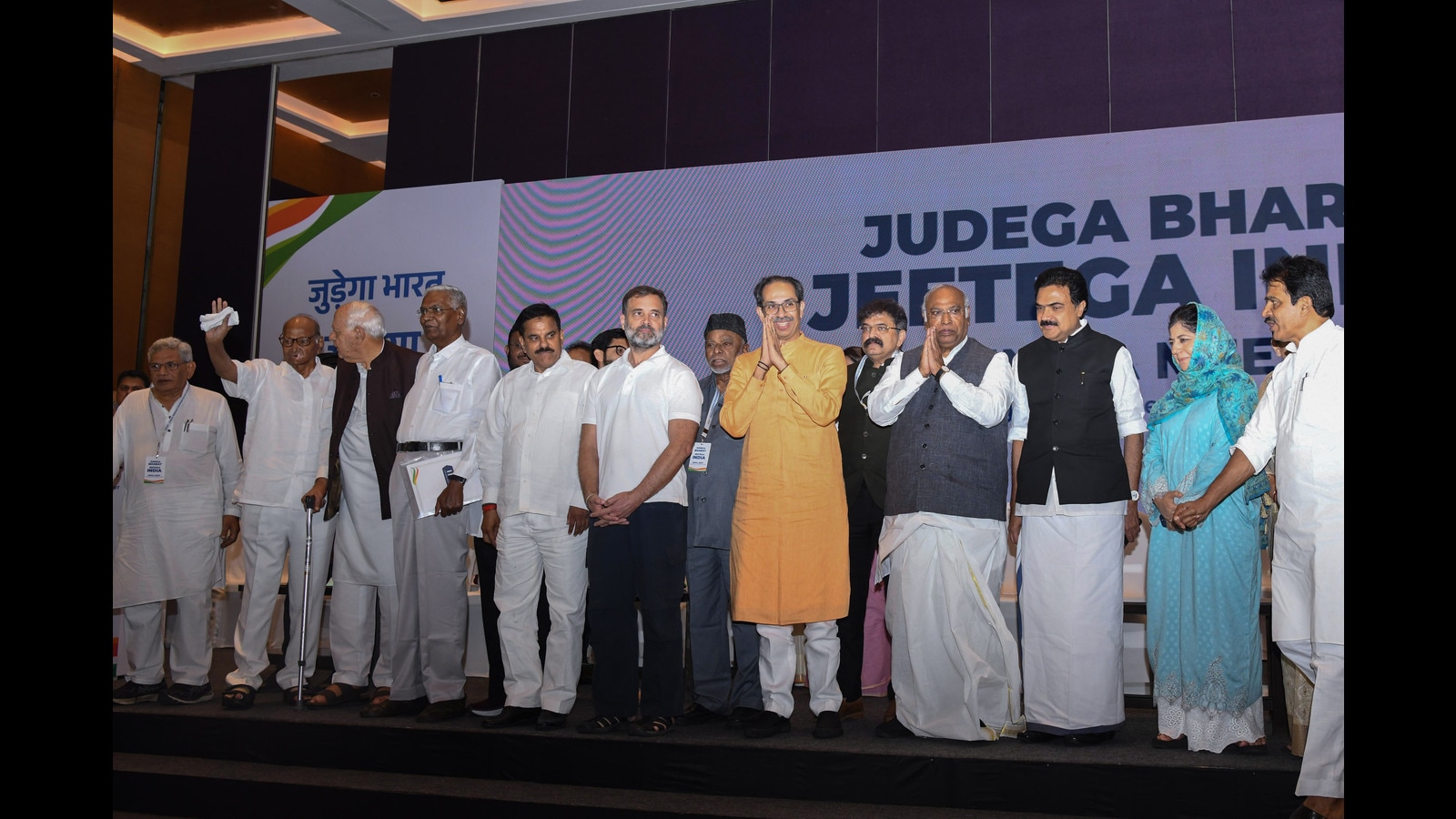
The newly formed Opposition alliance I.N.D.I.A. took a positive step last week in cementing a solid coalition in Mumbai. This decision was made during their third meeting, preceded by two previous conferences in Patna and Bengaluru. Their goal is to replicate the 1977 or 2004 scenario where the weaker Opposition won against the ruling dispensation.
Representatives from 28 political parties gathered for a two-day meeting on Thursday and Friday in Mumbai. Sixty-three attendees discussed a shared campaign strategy and ways to counter the N.D.A.
Following the meeting, the alliance declared they would participate in the election “together to the best of their ability.” They will begin organizing state seat-sharing arrangements immediately, using a “collaborative spirit of compromise.” Additionally, they aim to hold public rallies nationwide as soon as possible. A 13-member coordination was also set up.
The Opposition leaders realize there are many obstacles to overcome, both internal and external. The coalition faces a challenge in negotiating seat-sharing with regional parties.
The I.N.D.I.A. team faces the difficult task of overcoming inherent contradictions among coalition partners. They must agree on a give-and-take policy for seamless seat allocation and collaborate at the grassroots level. Congress leader Rahul Gandhi acknowledged it.
For example, in Delhi and Punjab, Congress and A.A.P. are political rivals, while Trinamool Congress, the Left parties, and Congress have their respective political positions in West Bengal. The Left and Congress also have a big stake in Kerala.
Mamata Banerjee suggested releasing the bloc’s manifesto by October 2nd, while Arvind Kejriwal proposed finalizing the seat-sharing for the Lok Sabha elections by the end of next month.
The main thing is to boost the morale of its workers, which has been affected by the B.J.P.’s nine-year tenure. Many are unwilling to endure another five years in the political wilderness. Therefore, choosing the most suitable candidate and reaching a consensus on specific seats is crucial. The give-and-take policy can help in this regard. It is also vital to ensure the victory of their candidate and the commitment of everyone in their group, including ground-level workers. These workers are confused about how to support a party they have been fighting against till yesterday.
There are other issues which are yet to be decided. The coalition must identify a viable candidate to challenge Prime Minister Narendra Modi and develop a new narrative. There is yet to be a consensus on the convenor or the Prime Ministerial face.
In all these, Congress remains the only pan-national Party in the block. Despite experiencing a decline in strength over the past decade, the Congress Party remains the only political entity with nationwide appeal. In the 2019 general elections, the Congress won 52 seats and came second in 209 seats. They received over 12 crores of votes, while the combined opposition bloc received less. Any change in their fortunes could significantly impact the country’s politics.
The Congress and B.J.P. are facing a direct contest in one-third of the Lok Sabha seats. The Party still holds a significant amount of influence in Punjab, Assam, Karnataka, Kerala, Haryana, Maharashtra, Jharkhand, Goa, Manipur, Meghalaya, Mizoram, and Nagaland, which together account for 155 Lok Sabha seats.
One significant concern is when the next elections will take place. The B.J.P. may be hesitant to call for early general elections due to their previous experience. 2004, they were expected to win, but the Congress-led U.P.A. surprisingly defeated them. The B.J.P. has a strong presence in the Hindi heartland but has yet to make substantial progress in the South, with 129 seats up for grabs.
However, some opposition chief ministers, such as Nitish Kumar, Mamata Banerjee, M.K. Stalin, and Arvind Kejriwal, speculate that the 2024 Lok Sabha elections may occur sooner. It could coincide with the upcoming Assembly elections in Madhya Pradesh, Chhattisgarh, Rajasthan, Mizoram, and Telangana. Additionally, the B.J.P. has advocated the ‘one nation -one election’ idea.
There is no confirmed news on whether the Lok Sabha elections will be advanced. Neither the B.J.P. nor the Election Commission has provided any indication. The final decision rests with Prime Minister Modi, known for making unexpected choices.
The B.J.P. considers Modi to be their lucky mascot. The Party governs ten states, and four states with the coalition led by the N.D.A. with over 55% of the seats in the Lok Sabha. Modi aims to take advantage of the Opposition’s chaos to win a third term.
The B.J.P. has made thorough preparations for every conceivable situation. It has mobilized around 40,000 booth workers to cover 100,000 booths across all 543 parliamentary constituencies.
The ruling Party keeps its plans secret and aims to reduce the Opposition’s influence while maintaining its strength. This includes neutrality with parties like BJD, Y.S.R.C.P., and B.R.S. Their ultimate objective is to prevent funds from flowing to the opposing side while getting more funds for B.J.P.
The next few months will see feverish activities in both camps. Modi’s popularity, B.J.P.’s financial resources, and strong organization may still give the ruling Party an edge. Assembly elections in Madhya Pradesh, Rajasthan, Chattisgarh, Telangana and Mizoram could be a trailer of what’s to come. (IPA Service)
The post INDIA Alliance Has To Successfully Tackle Seat Sharing Issue To Defeat BJP first appeared on Latest India news, analysis and reports on IPA Newspack.


